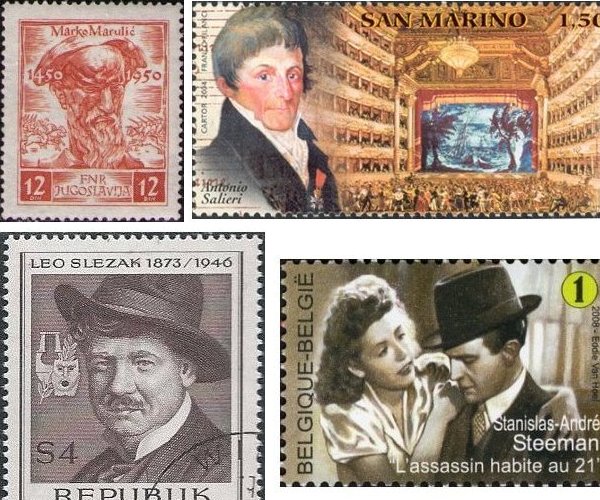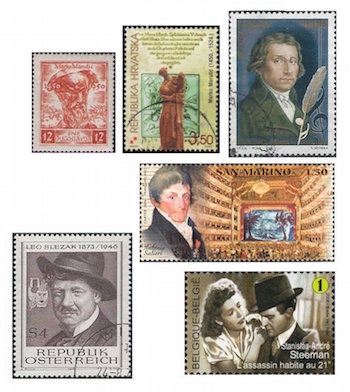The Arts on Stamps of the World — August 18
An Arts Fuse regular feature: the arts on stamps of the world.

By Doug Briscoe
We have only four persons of artistic renown on stamps of the world for this August 18: a multilingual Croatian Renaissance humanist, poet, and artist, Marko Marulić; the 18th-century Italian opera composer and rival of Mozart Antonio Salieri; the distinguished Moravian tenor Leo Slezak; and French film director Henri-Georges Clouzot.
A most interesting fellow was this Marko Marulić (Italian: Marco Marulo; 18 August 1450 – 5 January 1524). Croatians think of him as their national poet, the Crown of the Croatian Medieval Age, and the father of the Croatian Renaissance. Apart from his poetical works, he is credited with being one of the earliest thinkers to explore the realm of psychology. This he investigated in his Psichiologia de ratione animae humanae (apparently undated). His poetry was composed in three languages. Among the Latin works is the Davidiad (1517), a religious epic in fourteen books after the manner of Virgil. His Croatian pieces include an epic poem, Judith (1501, published 1521), a biblical poem, Susan, in 780 stanzas, secular poetry, and anti-Ottoman laments such as the Molitva suprotiva Turkom (Prayer Against the Turks, 1493-1500), which includes a hidden acrostic. In the Italian Vulgate are three letters and two sonnets. Some satirical epigrams, love poems, and verses in praise of animals, all very different from his other writings in their earthiness and vigor, were discovered only as recently as 1995. In addition, it is thought that the nine woodcut illustrations in the second edition of Judith are Marulić’s own. The older of the two Marulić stamps, the one from 1950 Yugoslavia, shows a bust of the artist made by the 20th-century Slavonian sculptor Ivan Meštrović, whose birthday coincidentally we marked here just three days ago. (At the time, I was unaware of the existence of this stamp!) The later one is a Croatian stamp from the year 2000.
We can celebrate the birthday of Antonio Salieri (18 August 1750 – 7 May 1825) without guilt, because he didn’t murder Mozart or anybody else. His worst crime is the prolific composition of consistently mediocre music. But he was much admired in his day, important in terms of establishing operatic trends, and an important teacher, with Beethoven, Schubert, and Liszt numbering among his students. The fact that Salieri and Mozart got along well enough is proved by the very recent rediscovery of a miniature cantata they wrote together! Known to exist but only unearthed in November 2015, it can be heard here. (As for the music, Alex Ross wrote in the New Yorker: “…(T)he story behind the music…holds more interest than the music itself, which is uniformly dull.”) Another thing, Salieri’s 26 Variations on La follia di Spagna (1815) are the earliest example I can think of of variations expressly composed for orchestra. The two Salieri stamps come from Italy and San Marino.

August 18 is also the birthday of Leo Slezak (1873-1946), a renowned Moravian tenor and father of the actor Walter Slezak (the villain in Hitchcock’s Lifeboat). Leo Slezak performed at Covent Garden in 1900 and at the Met beginning in 1909. There he was touted as the most famous Otello of his generation, performing the role under Toscanini. It is Slezak who is responsible for one of the most famous of operatic anecdotes: in Wagner’s Lohengrin, the title character makes his grand appearance in a boat drawn by a huge swan. During one performance in Austria, however, a stage hand sent the swan out too early, before Slezak could embark. Slezak turned to the audience and quipped: “Wann fährt der nächste Schwan?” (“When does the next swan leave?”). Slezak made hundreds of recordings from the early 1900s to the 1930s. He also appeared in a small number of European films of the 30s and 40s. His final film role was as the sultan in the 1943 German spectacular Münchhausen.
Henri-Georges Clouzot (18 August 1907 – 12 January 1977) worked as a script translator in Berlin until being fired because of his association with Jewish producers. Then he contracted tuberculosis and was bedridden for five years. Ironically, because—out of a desperate need for money—he worked for the German film production company Continental during the war, he was banned from filmmaking until 1947. Thereafter, it seems, all was forgiven. Clouzot’s two finest films are The Wages of Fear (1953) and Les Diaboliques (1955). His documentary The Mystery of Picasso (1956) was named a national treasure by the French government. But on the Belgian stamp is Clouzot’s first feature, L’Assassin habite au 21 (The Murderer Lives at Number 21) from 1942.
A graduate of the University of Massachusetts with a B.A. in English, Doug Briscoe worked in Boston classical music radio, at WCRB, WGBH, and WBUR, for about 25 years, beginning in 1977. He has the curious distinction of having succeeded Robert J. Lurtsema twice, first as host of WGBH’s weekday morning classical music program in 1993, then as host of the weekend program when Robert J.’s health failed in 2000. Doug also wrote liner notes for several of the late Gunther Schuller’s GM Recordings releases as well as program notes for the Boston Classical Orchestra. For the past few years he’s been posting a Facebook “blog” of classical music on stamps of the world, which has now been expanded to encompass all the arts for The Arts Fuse.
